Places to Stay the Night Read online
Page 3
Troy lit a cigarette. “She’s fucking nuts,” he said. His eyes moved across the room. “What’s everyone doing here anyway?”
“Bringing casseroles,” she said. “Somebody brought that string bean kind you like. The one with the fried onions on top and the cream of mushroom soup.”
“No shit,” he said again.
“And somebody brought that good coconut cake. With the cherries and pineapple.”
Troy nodded. “She’ll be back,” he said, bunching up his eyebrows again. “Don’t you think?”
Dana looked over at their father. He was sitting in the Naugahyde La-Z-Boy, all slumped and old-looking, holding on tight to a bottle of beer, while some ladies from the church talked to him in real quiet voices.
“I don’t know,” she said. “She took everything with her.”
“Well, she can bring it all back,” Troy said angrily. “A person can bring stuff back just as easy as they take it away.”
“Sure,” Dana said. Her father was nodding now. He hadn’t shaved since yesterday, a sure sign that Libby was gone. She hated facial hair, so Tom always shaved real close, and splashed on Old Spice afterward.
Caitlin came over to them. She had a casserole of hamburger meat with crushed Fritos on top.
“I told my mother this is the most disgusting stuff in the world,” Caitlin said. She held the dish away from her as if it were a dead rat or something.
Troy picked some Fritos off the top and tasted them. “Good,” he said.
Caitlin’s black dress was shiny in spots, and stray threads hung from the hem. She’d bought it at Goodwill and thought it looked sophisticated.
“There’s lots of good food in the kitchen,” Dana told her.
“Your father looks just awful,” Caitlin said.
The three of them turned toward Tom. He was working on another beer and still nodding at the church ladies.
“They’re trying to convert him,” Troy said.
Dana laughed. “Good luck.”
“Why is Nadine sitting in the car?” Caitlin said.
Troy shrugged. “She doesn’t like coming in.”
“But it’s like ninety degrees out there. She’s baking,” Caitlin said. She poked Troy’s arm. “Did you get another tattoo?”
He pulled up his sleeve and showed her the latest one, Yosemite Sam.
“Ugh,” Caitlin said. “That is so Neanderthal.”
“Nadine got a rosebud right on her ass,” he said. He said it proudly.
Dana and Caitlin rolled their eyes at each other.
“You know,” Caitlin said, her voice soft. “Your mom had the right idea. Getting out of here. Moving on.”
“Yeah,” Dana said. But she wasn’t sure she really agreed. She just said yeah and nodded her head, the way her father was doing with the ladies from church.
“You are not going to believe this,” Troy told Nadine.
She had her head hung out the window, face up toward the sun. The thing about Nadine was she never tanned. Instead, she got all hot pink and blotchy, as if she had hives or something.
Troy sighed. “Put your head in the car. You’ll burn.”
“I used sun screen,” she said, but brought her head back inside anyway. “Number forty-five.”
The car smelled like her sweat. Troy frowned. Usually he found something sexy about that, but right now it was turning his stomach.
“You’re not going to believe this,” he said again.
“Like that museum in Florida I told you about?” she said. “Believe It or Not? Believe it or not, a guy slapped another guy’s face for like three months. Without stopping.”
“Nadine—”
“In Russia,” she added, as if it mattered.
“My old lady left,” Troy said. “She went to Hollywood to become a fucking movie star.”
Nadine laughed. “Give me a break,” she said. “I mean, she’s ancient.”
The old couple who lived down the road knocked on the side of Troy’s car.
“Why are you sitting here like this?” the old lady, Mrs. Yarrow, said. She peered inside, her nose twitching like a rabbit’s. “Who’s the girl?”
Mr. Yarrow tugged on her arm. “Come on,” he said. “Tom needs to see that we came. This one’s a lost cause. You know that.”
Troy watched the extra flesh on Mrs. Yarrow’s upper arm sway and sag.
“Nice to meet you too,” Nadine said as they walked away.
Troy backed out of the driveway, making sure the tires spit gravel as he went. He was a lost cause to everybody. He and Dana, who was only eleven months older, were in the same grade at school. But for the past few years, she’d walked by him in the hallways as if she’d never seen him before, as if he were a stranger. Just a week or two ago his mother had come into his room and sat on his bed and told him so herself. “I have done everything I can to make you respectable. To make you somebody.” That was a joke. She was a terrible mother. He hardly ever even saw her. Sometimes he did things just so she’d notice him. When he was a kid, he used to do things like beat up other kids and cut school. There were always truant officers dragging him home, and teachers calling his mother, and parents banging on the door at night with their bruised sons as evidence. The principal had looked at him and said, “You are going to be nothing except a juvenile delinquent, Troy Harper.” She had shaken her head, all her tight white curls bouncing around. “To think your father was something great.”
Lately, Troy had done worse things. He’d stolen cars with his buddies. Taken them for joy rides until they ran out of gas, then abandoned them. He got a girl pregnant last year, someone who had dropped out of school way before Troy ever met her and already had a kid even though she was only seventeen. Troy’s father had paid for an abortion. He took drugs, came home so high he couldn’t even answer his mother’s questions. “What are you on now?” she would ask him. “Where have you been?” But he’d be too stoned to respond.
Then, in the winter, he met Nadine at a party. And he really went wild. He brought her home all the time, both of them drunk or stoned, until his mother told him Nadine wasn’t allowed in the house anymore. He started staying overnight at Nadine’s. He hardly ever went to school. When his mother asked him why he was ruining his life, he laughed.
Sometimes, Nadine asked him if he loved her. Sure, he always told her. Of course. But he knew he was lying. It was her wildness he loved. The way she would do anything, try anything, say anything. She was always shoplifting, bringing him new sweaters and after-shave. Expensive stuff. She had a racket where she stole things from stores and then returned them for cash. He and his buddies had started fooling around with girls when they were in junior high. But it was always the same, hurried and in the dark, still half dressed. Even the girl he’d gotten pregnant, he’d hardly seen her face. But Nadine would do anything. She’d let him do anything. His father seemed to know that. He’d taken Troy aside and said, “Stop thinking with your dick.” All Troy had done was laugh at that.
He wasn’t sure where any of this was leading. He didn’t even really care. The truth was, he liked Nadine. He liked the things she’d let him do with her, the things she thought up herself. He liked being high all the time. Or at least, until today when he walked in and saw all those people, he did. But something clicked in his gut when his sister told him their mother had left. It was as if he’d gone one step too far, as if he’d made her go away. He had shaken his head, trying to clear the fog there. But he couldn’t shake the feeling.
He tried again now, shaking his head. He even pulled over to the side of the road, and squeezed his eyes shut hard so he could see squiggles and stars on the back of his eyelids.
“What’s wrong?” Nadine said.
Troy opened his eyes and looked right at her, like it was the first time.
“You miss your mama?” she said.
“Shut up.”
Nadine lit a joint and passed it to him. For a moment he thought about refusing it. He thought abou
t dumping Nadine and driving to California himself, finding his mother and bringing her back. Maybe it wasn’t too late.
“You love me?” Nadine whispered.
“Yeah,” he said. He looked in the opposite direction, away from her.
“Say it.”
He took the joint and sucked on it hard.
“Say it,” Nadine said.
“No,” he told her. “I don’t say it.” He pulled back onto the road.
“Actions speak louder than words,” Nadine said. “Right?”
He thought about his mother getting in her car and driving away. That sure as hell said a lot.
Nadine reached over and unzipped his jeans. This was one of her favorite things to do—give him a blow job while he drove. He looked down at the back of her head, moving slowly up and down. For the first time, he wondered if he even liked Nadine.
“As for me,” she said, when he was done, “I’m perfectly happy that you’re a lost cause. I wouldn’t want it any other way.”
Goldilox was a diner in the East Village that was built to look dated. Everything was stainless steel and Formica. The booths were cracked red vinyl. The counter had stools with mustard yellow seats. There was a jukebox filled with Glenn Miller, Louis Armstrong, Frank Sinatra. Outside was a blinking neon sign of a martini glass. Above the olive the letters G-O-L-D-I-L-O-X slowly lit up, one by one, then flashed GOLDILOX in bright blue before beginning to slowly spell it out again.
Millie liked to pretend she was in Happy Days whenever she went into the diner. She liked to be the Fonz. Renata was not a mother who monitored how much television Millie watched. She felt television was a good thing. She taught Millie all the words to the theme songs from The Beverly Hillbillies and F Troop. She taught her the names of all the characters on the old Dick Van Dyke Show. The people who came into Goldilox had kids who hugged large Babar and Madeline books, who watched National Geographic Specials and listened to Mozart. But Renata knew better.
On Mondays Renata worked the early shift and got out at three, and Millie liked to come and get her and walk her home. Today, the sky hung low and gray again. More storms on the way. Earlier that week, a family picnicking in Prospect Park had been struck by lightning and killed. Some people thought this was the beginning of Armageddon. The beginning of the end.
“It’s environmental,” Renata explained to Millie. “Global warming.” There were answers to everything, she thought. If people only looked for them.
When Millie came in that afternoon, the restaurant was almost empty. She sat on one of the stools at the counter, spinning as fast as she could.
“Give Millie a milkshake,” Liz told Renata. Liz was the owner. She was tall, though not as tall as Renata, and resembled the Wicked Witch in The Wizard of Oz. Millie was afraid of her.
Renata mixed the milk and ice cream and syrup in the silver container, then started to whip it.
“Back home,” she told Liz, “we call these frappes.”
“I thought frappes were after-dinner drinks,” Liz said. She never looked at people when she talked to them. Her eyes always darted around the restaurant. “Hey! Who has section two?” she shouted. “There’s a fourtop there that needs cleaning pronto!” When a busboy ran past, she said, looking at the front door, “You know, like crème de menthe frappe.”
Millie liked her milkshakes thick and Renata made this one so thick it was almost impossible to pour it into a glass.
“That’s fra-pay, “she told Liz. She spooned the drink into the glass, smiling. Millie would love this one.
“Whatever,” Liz said, then walked away.
Renata turned toward where Millie had been spinning on her stool. But her daughter had stopped and was resting her head on the shiny counter.
“Did you make yourself sick?” Renata asked her.
Millie nodded. She did not lift her head.
“I made you the thickest milkshake ever,” Renata said.
Millie smiled but did not lift her head.
“Hey,” Renata said. She touched her daughter’s forehead. It did not feel warm, but this was not a technique that Renata had mastered.
Millie opened her eyes. “Is the world ending?”
“Yes,” Renata said. “But not in our lifetime.”
“Maria Ramone’s mother said it’s not. She said on the last day the skies will open and all people will be judged.”
Renata sat on the stool next to Millie and spilled her tips onto the counter. “That’s stupid,” she said.
“Mama?”
Renata didn’t answer. As soon as they got home she would go across the hall and tell Maria’s mother to stop telling Millie stupid lies.
“I feel dizzy,” Millie whispered.
Renata glanced over. Her head was still resting on the counter. The milkshake was sitting untouched. She tried to remember if there was a flu going around. From someplace far away she could hear thunder.
“Does anything hurt?” Renata asked.
Millie shook her head. “I just feel funny. Like I’m drunk.”
Renata frowned. “Are you afraid about what Mrs. Ramone told you? About Judgment Day?”
Millie lifted her head slowly. She blinked as if she was struggling to focus, then pretended she was just acting funny. “Nothing scares the Fonz,” she said. “Nothing.”
The rain started as soon as they stepped outside.
“Shit,” Renata said. She grabbed Millie’s hand again and started to run.
“I can’t, Mama,” Millie said.
“Of course you can,” Renata told her.
“No, Mama,” Millie said, the hint of a whine creeping into her voice. “I’m all off balance.”
Renata slowed down a little. She glanced back at Millie. She had her mouth open slightly, and her eyes were as round as saucers. She even seemed to be dragging her leg a little, the way she did when she pretended she was the Ghost of Christmas Past after they watched Mister Magoo play Scrooge on television. Millie was terrified. Renata decided she was really going to give it to Mrs. Ramone.
By the time they reached their building, they were drenched, and Renata had to carry Millie up all four flights of stairs.
“Listen,” Renata said, “there’s no such thing as Judgment Day. Remember I told you about global warming? About cutting down the trees in the Amazon? About using aerosol cans?” As she talked she stripped her daughter, whose body had grown as limp as a rag doll. “About freon and car exhaust?”
Their one plant, a coleus that sat in a tiny plastic green pot on the windowsill, crashed to the floor. It had been a gift from Jack, the man Renata sometimes slept with. When he gave it to them, he’d assured Millie that it was impossible to kill a coleus. “But we’ve even killed cactus,” Millie had told him. “These things,” he’d said, “are invincible.”
Now there it was, in a heap of dirt, on the floor.
But Millie hardly seemed to notice. Not long ago, she had named everything in the apartment. The plant was Penelope. The sofa, Sylvester. Even an old lamp had a name, Joseph. Maybe, Renata thought, glancing over at Penelope scattered across the floor, Penelope’s life could still be saved. She could replant it. Jack had told her the plant needed a bigger pot, more soil.
Millie’s eyes were half closed, but when the next round of thunder came, she smiled and said, “Tater wagons.”
Renata wrapped a blanket around her. “Tater wagons?”
“That’s what Old Man Dardowitz said. He said that’s the tater wagons coming.” Her voice did sound like she was a little drunk, Renata thought.
Renata smoothed back her daughter’s hair, as if to erase all the myths inside Millie’s head. “Mrs. Ramone is bad enough,” she said, “but Old Man Dardowitz. Really, Millie.”
He was a man who lived on the street, huddled in a corner, dressed in rags. Cats followed him everywhere. The kinds of cats that made people nervous—one-eyed or ribs showing or ears chewed up. There was a tiger-striped one with a harelip, long teeth protruding, drool dr
ipping. But they all loved the old man.
“He knows wonderful stories,” Millie said.
“Thunder is a scientific phenomenon, Millie,” Renata said.
She put on the old lamp, and the television, ignoring the spilled plant for now.
“I’ll be back in a few minutes,” she told her daughter.
Millie nodded, and waved.
“It’s just the flu,” Renata said. “Vitamin C. Plenty of fluids. Sleep.”
“Mrs. Ramone,” Renata said. “May I come in?”
Mrs. Ramone was short and squat, like a jeep. She smelled of fried foods and garlic, and always wore black. A crucifix hung on a tarnished chain around her neck, and she had a habit of rubbing it whenever Renata spoke to her. She was younger than Renata, but still somehow Renata called her Mrs. Ramone. As far as she knew, there was no Mr. Ramone. The five children who clung to the woman’s knees and arms could have sprung from anywhere.
Mrs. Ramone did not step back to let Renata inside.
“We’re eating,” she said. “Go away.”
“Listen,” Renata said, leaning against the door frame, “I don’t want you telling Millie any more stories. You frighten her with all this talk about the sky opening up and people being judged.”
Mrs. Ramone’s face remained impassive. Her eyes were as dark as a well. She had a hairy upper lip, sideburns.
“I like to tell her the truth about things,” Renata added.
One of the Ramone children was staring straight up at Renata, until the oldest, a boy who stuttered badly, elbowed him. Then the little boy looked away. Renata thought the older boy actually spat, as if to ward off evil.
“You see,” Renata continued, “we don’t believe in things like that. I guess you could say we are atheists even.”
Mrs. Ramone pressed harder on her crucifix. She muttered something in Spanish that Renata could not understand.
“You see,” Renata said again, but Mrs. Ramone was shooing her children inside, turning her back on Renata, closing the door.
Jack was tall, with long hands and feet that reminded Renata of skis. He was from Trinidad, and she’d known him since they’d both moved to New York and taken art classes together. Sometimes Renata liked to think he was Millie’s father. Jack thought that was a ridiculous notion. His children, he said, would surely be dark-skinned. At least as dark as coffee, or chocolate.

 Kitchen Yarns
Kitchen Yarns Waiting to Vanish
Waiting to Vanish Morningstar
Morningstar Something Blue
Something Blue Providence Noir
Providence Noir Somewhere Off the Coast of Maine
Somewhere Off the Coast of Maine Jewel of the East
Jewel of the East Queen Liliuokalani: Royal Prisoner
Queen Liliuokalani: Royal Prisoner The Knitting Circle
The Knitting Circle Leonardo da Vinci: Renaissance Master
Leonardo da Vinci: Renaissance Master An Ornithologist's Guide to Life
An Ornithologist's Guide to Life The Red Thread
The Red Thread She Loves You (Yeah, Yeah, Yeah)
She Loves You (Yeah, Yeah, Yeah) Brave Warrior
Brave Warrior How I Saved My Father's Life (and Ruined Everything Else)
How I Saved My Father's Life (and Ruined Everything Else) An Italian Wife
An Italian Wife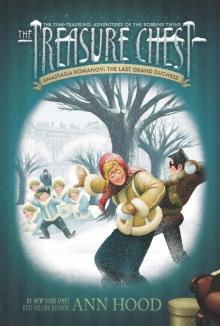 Anastasia Romanov: The Last Grand Duchess #10
Anastasia Romanov: The Last Grand Duchess #10 Prince of Air
Prince of Air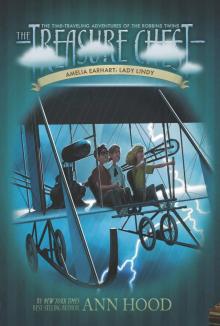 Amelia Earhart: Lady Lindy
Amelia Earhart: Lady Lindy Places to Stay the Night
Places to Stay the Night Little Lion
Little Lion Comfort
Comfort Angel of the Battlefield
Angel of the Battlefield